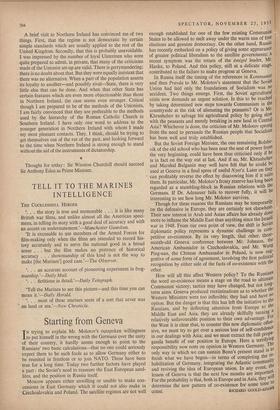Starting from Geneva
IN trying to explain Mr. Molotov's outspoken willingness to put himself in the wrong with the Germans over the unity of their country, it hardly seems enough to point to the Russians' two basic calculations—that no one could seriously expect them to be such fools as to allow Germany either to be reunited in freedom or to join NATO. These have been true for a long time. Today two further factors have played a part : the Soviet's need to reassure the East European satel- lites, and the position in Russia itself.
Moscow appears either unwilling or unable to make con- cessions in East Germany which it could not also make in Czechoslovakia and Poland. The satellite regimes are not well enough established for one of the few existing Communist States to be allowed to melt away under the warm sun of free elections and genuine democracy. On the other hand, Russia has recently embarked on a policy of giving some appearance of greater political liberalism to the satellite governments; a recent symptom was the return of the emigre leader, Mr. Hanke, to Poland. And this policy, still at a delicate stage. contributed to the failure to make progress at Geneva.
In Russia itself the timing of the references in Kommunist and then Pravda to Mr. Molotov's statement that the Soviet Union had laid only the foundations of Socialism was no accident. Two things emerge. First, the Soviet agricultural crisis now demands an urgent solution. Is this to be reached by taking determined new steps towards Communism in the countryside at the risk of alienating the peasants? Or is Mr. Khrushchev to salvage his agricultural policy by going slow with the peasants and merely breaking in new land in Central Asia? Whichever is done, the criticism of Mr. Molotov sprang from the need to persuade the Russian people that Socialism has been well and truly established.
But the Soviet Foreign Minister, the one remaininOolshe• vik of the old school who has been near the seat of power from the very beginning, could have been thus criticised only if he is in fact on the way out at last. And if so, Mr. Khrushchev and Marshal Bulganin may well have felt that he could be used at Geneva in a final spree of useful Nyet's. Later on they can profitably reverse the effect by disavowing him if it suits them. In particular, Mr. Molotov's frosty reserve has long been regarded as a stumbling-block in Russian relations with the Germans. If Dr. Adenauer fails to recover fully. it will be interesting to see how long Mr. Molotov survives. Though for these reasons the Russians may be temporarily on the defensive in Europe, they are certainly not elsewhere. Their new interest in Arab and Asian affairs has already done more to inflame the Middle East than anything since the Israeli war in 1948. From our own point of view, the shift in Soviet diplomatic policy represents a dynamic challenge in corn' petitive co-existence. By its very length, that other, three.* month-old Geneva conference between Mr. Johnson, the American Ambassador in Czechoslovakia, and Mr. Wang Ping-nan, the Chinese Ambassador in Poland, is now sag' gestive of some form of agreement, involving the first political recognition by either side of the facts of co-existence with the other.
How will all this affect Western policy? To the Russians the word co-existence means a stage on the road to ultimate Communist victory; tactics may have changed, but not long' term aims. Geneva produced recriminations as to whether the Western Ministers were too inflexible; they had and have no option. But the danger is that this has left the initiative to the Russians, and by deflecting attention from Europe to the Middle East and Asia, they are already skilfully turning a, relatively unfavourable position to their own advantage. For the West it is clear that, to counter this new diplomatic offer!' sive, we must try to get over a serious loss of self-confiden0 in our dealings with Asia; and we must extract the full pro's" ganda benefit of our position in Europe. Here a terrifying The responsibility now rests on opinion in Western Germany. -- Th only way in which we can sustain Bonn's present stand is to finish what we have begun—in terms of completing the re' habilitation of Germany, integrating the Atlantic community and reviving the idea of European union. In any event, the lesson of Geneva is that the next few months are important. For the probability is that, both in Europe and in Asia, they Will determine the new pattern of co-existence for some time to


























































 Previous page
Previous page